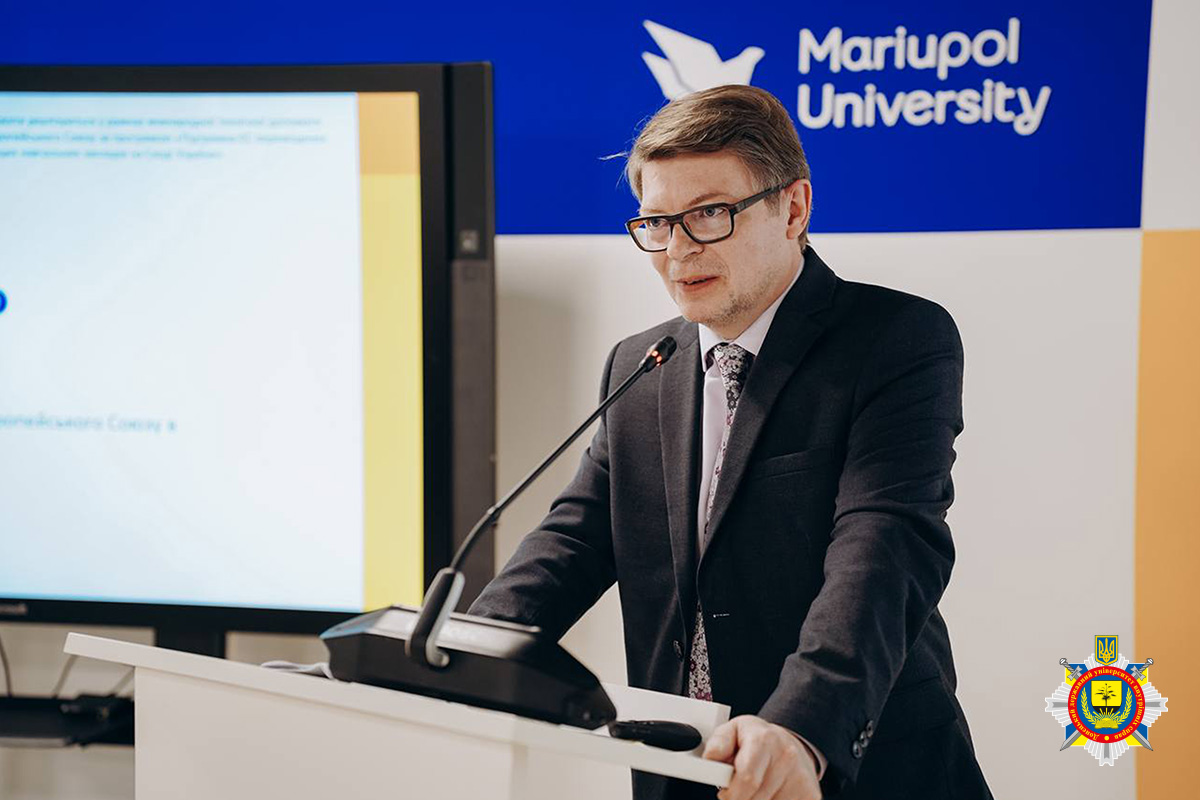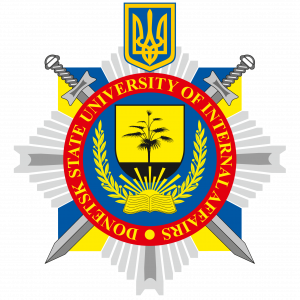Implementation of the international project “Open educational space for students and the community” (EDUSPACE) has been completed. Its final event was the “Third Mission of a Displaced Educational Institution” conference. On May, 24 in the front office of the Mariupol State University it brought together the academic communities of the project partners and representatives of the institutions that provided important support. A delegation of the DonSUIA headed by first vice-rector Yehor Nazymko took part in the event.
The event began with greeting the participants, represented by a displaced after the full-scale invasion staff of the Mariupol State University and the Donetsk State University of Internal Affairs. Both educational institutions started the EDUSPACE project in Mariupol, so it had two stages: creation of educational spaces and services for the Mariupol community, and currently for the communities of the University’s present location.

 The MSU rector Mykola Trofymenko was the first to address the audience as the host party. He emphasized the importance of the infrastructural focus of the project for the Universities that due to the war lost their educational facilities and received those that required great efforts to modernize them and make the staff feel at home there. He also thanked the partner University for joint work, and the European Commission and the European Union for their support, because such synergy made the implementation of the project not only possible, but also successful.
The MSU rector Mykola Trofymenko was the first to address the audience as the host party. He emphasized the importance of the infrastructural focus of the project for the Universities that due to the war lost their educational facilities and received those that required great efforts to modernize them and make the staff feel at home there. He also thanked the partner University for joint work, and the European Commission and the European Union for their support, because such synergy made the implementation of the project not only possible, but also successful.
 Then the floor was taken by Stella Shapoval, deputy director general of the directorate of international cooperation at the Ministry of Education and Science of Ukraine. She thanked the international institutions that supported vital for Ukrainian Universities initiatives:“By their activity, their participation in EU projects, cooperation with international partners the Universities provide an example of how to compete with European educational institutions and prove that Ukrainian Universities are not worse, and in some cases, are even better than foreign ones. I want to personally thank you for your indomitability and strength of spirit, for continuing your work and raising a new generation to be resistant to trials – only such youth will be able to rebuild new Ukraine.”
Then the floor was taken by Stella Shapoval, deputy director general of the directorate of international cooperation at the Ministry of Education and Science of Ukraine. She thanked the international institutions that supported vital for Ukrainian Universities initiatives:“By their activity, their participation in EU projects, cooperation with international partners the Universities provide an example of how to compete with European educational institutions and prove that Ukrainian Universities are not worse, and in some cases, are even better than foreign ones. I want to personally thank you for your indomitability and strength of spirit, for continuing your work and raising a new generation to be resistant to trials – only such youth will be able to rebuild new Ukraine.”

 After those inspiring words to displaced Universities, first vice-rector of the DonSUIA Yehor Nazymko addressed the participants of the conference. Summing up the impact of the project, he emphasized that the Mariupol University is the heart and spirit of the community, and the Donetsk State University of Internal Affairs is its shield: “Despite all the difficulties that have occurred on our way since the project has started – the beginning of the war, the University relocation to the Kirovohrad region, we managed to fully achieve the goal of the project and fulfill all the tasks assigned to the University.
After those inspiring words to displaced Universities, first vice-rector of the DonSUIA Yehor Nazymko addressed the participants of the conference. Summing up the impact of the project, he emphasized that the Mariupol University is the heart and spirit of the community, and the Donetsk State University of Internal Affairs is its shield: “Despite all the difficulties that have occurred on our way since the project has started – the beginning of the war, the University relocation to the Kirovohrad region, we managed to fully achieve the goal of the project and fulfill all the tasks assigned to the University.
 I am grateful to everyone who is involved in the project implementation, because we have done a great job that will enrich each of us with new promising ideas, and the efficient work will leave good positive impressions and provide an impetus for the implementation of further initiatives and projects.”
I am grateful to everyone who is involved in the project implementation, because we have done a great job that will enrich each of us with new promising ideas, and the efficient work will leave good positive impressions and provide an impetus for the implementation of further initiatives and projects.”

 On behalf of the academic community of the University of Genoa (Italy), head of the department of Pedagogical Sciences Guido Amoretti, expressed his gratitude and sincere congratulations to the partners in his online speech. This Italian institution hosted Ukrainian colleagues to share the experience in creating open spaces and helped them with expertise for opening new educational programs.
On behalf of the academic community of the University of Genoa (Italy), head of the department of Pedagogical Sciences Guido Amoretti, expressed his gratitude and sincere congratulations to the partners in his online speech. This Italian institution hosted Ukrainian colleagues to share the experience in creating open spaces and helped them with expertise for opening new educational programs.
 After an excursion, the conference participants continued to work in sections. Their topics dealt with the development of popular educational programs and interaction with the community. After a more detailed discussion on what had been done under the project and considering plans for the future, the academic communities of the Universities joined the round table dedicated to the role of the third mission centers in educational institutions. The event was held in a mixed format with the participation of the University-Community: Strengthening Cooperation (UNICOM) project team.
After an excursion, the conference participants continued to work in sections. Their topics dealt with the development of popular educational programs and interaction with the community. After a more detailed discussion on what had been done under the project and considering plans for the future, the academic communities of the Universities joined the round table dedicated to the role of the third mission centers in educational institutions. The event was held in a mixed format with the participation of the University-Community: Strengthening Cooperation (UNICOM) project team.










